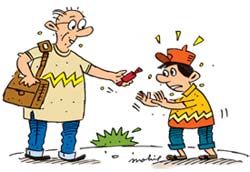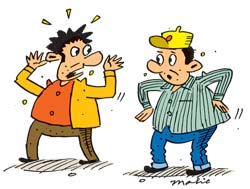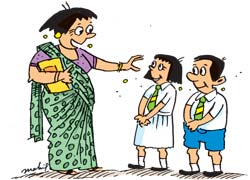|
 by
R. S. Karunaratne by
R. S. Karunaratne
How to use
punctuation marks
Punctuation marks are necessary to make the meaning of what you write
clear. The following are the standard punctuation marks used in writing.
. full stop or period
Mark Name
, comma
; semi-colon
? question mark
! exclamation mark
( ) parentheses or
brackets
_ dash
- hyphen
' apostrophe
" " quotation
marks/speech
marks/inverted
commas
Mark Name
1. Full stop or period (.)
A full stop is used to mark the end of a sentence. It is also used to
mark abbreviations.
Tell her that it was her husband's last wish.
|

“No!” cried the little boy |
Samson returned to Sri Lanka after working for two years in the U.A.E
.(United Arab Emirates)
If a sentence ends with a question mark or exclamation mark, do not
add a full stop.
What do you want me to do?
Stop hogging the cheese and pass it round!
2. Comma ( , )
The comma is used to indicate the least separation or pause. However,
it is a very important punctuation mark.
A comma can be used to separate individual items in a list.
She bought some books, magazines, pens, papers and a bottle of gum.
The omission of a comma can change the meaning of a sentence.
Bush claimed Saddam planned to attack Iran.
The use of a comma gives us a clear picture.
Bush claimed, Saddam planned to attack Iran.
The comma is used to separate two or more adjectives defining a noun.
Her father was a quiet, gentle, compassionate man.
A comma is used to separate the words used in addressing a person.
Your name, Mr. Francis, reminds me of your old master, Dr. Godwyn.
3. Semi-colon ( ; )
The semi-colon indicates a break stronger than that represented by a
comma, but weaker than that represented by a fullstop.
|

“What is this new law?” he asked. |
Some people are honest; others aren't.
To satisfy man's selfish desires the polar bear in North America is
under threat, hunted by sportsmen; in Borneo and Sumatra the orang-utan
has become part of a smuggling racket.
Use a semi-colon in a list when commas are insufficient because they
have already been used to separate individual items.
You are advised to take with you: a clean towel; a pair of shorts,
not too tight; a few pens, of different colours; a notebook with a lot
of pages and, of course, your passport.
4. Colon ( : )
The colon is used to introduce a quotation. The sailors deserted to
the Dutch, and shouted across the river: "We did fight for tickets, now
we fight for dollars."
5. Question mark ( ? )
The question mark is used to indicate that a question has been asked.
"What is this new law?" he asked.
"Why do you think he wanted to be there?" said James in a whisper.
6. Exclamation mark ( ! )
The exclamation mark is used after exclamations.
"No!" cried the little boy
"God bless you, brother!" he said.
Conventional greetings do not require exclamation marks.
Good morning, Mr. Alexander.
Good afternoon, Miss Elizabeth.
7. Parentheses or Brackets
Parentheses or brackets can be used to separate a word or a group of
words from the main sentence.
The third period is really an extension of the second, and has little
to do (as some critics have suggested) with his developing deafness.
8. Dash ( )
The dash is used to mark a parenthesis instead of commas or brackets.
I phoned Dr. Soyza - he's our family doctor - and asked his advice.
|

Good morning, Mr. Alexander. |
The dash is used to indicate an abrupt change of thought.
That was how he went to Ireland - a poor miserable slave.
9. Hyphen ( - )
The hyphen which is shorter than the dash is used to link two or more
words to form a single compound word.
Attorney-at-law; father-in-law
The hyphen is used to make compound adjectives.
He was a fine fellow and very good-natured.
The hyphen is used to link prefixes to certain words.
Mrs. Chandrika Bandaranaike is an ex-President of Sri Lanka.
10. Apostrophe ( ' )
An apostrophe is used to denote a contraction.
I will need you at 7 o'clock.
The apostrophe is used to show the possessive form of a noun.
I saw Susan's dog on the beach.
11. Quotation marks ( " " )
The quotation marks indicate direct speech or quotation.
"Smith Smith! If you love your country, shoe my horse," cried the
horseman.
For beginners:
Let's make
sentences
It is easy to make sentences in English. Fill in the blanks with
suitable words and you will have a meaningful sentence.
I am ................ (write your name)
You are .................. (write your friend's name)
We are ............... and ............... .
(write your name and your friend's name)
............... is a boy. (write a boy's name)
............... is a girl. (write a girl's name)
Mr. ............... is my father.
(write your father's name)
Mrs. ................ is my mother.
(write your mother's name)
Learn how to use 'is' and 'are' in sentences.
Use 'is' with singular subjects.
Use 'are' with plural subjects.
Now study how 'is' and 'are' are used in sentences.
He is a boy.
She is a girl.
The dog is an animal.
This is a tree.
That is a door.
They are boys.
They are girls.
Dogs are animals.
These are trees.
Those are doors.
'Am' is used only with `I'.
I am a boy.
I am a girl.
I am a student.
I am a teacher.
I am a fisherman.
When you introduce yourself to others use 'am'.
I am a boy.
I am a girl.
I am Herat.
I am Nalini.
Note the change from "I" to "He" or "She"
I write --- He writes
I read --- She reads
I play --- He plays
I learn --- She learns
I teach --- He teaches
I walk --- She walks
I ask --- He asks
I answer --- She answers
I catch --- He catches
I kick --- She kicks
I say --- He says
I see --- She sees
I take --- He takes
I have --- She has
I am --- He is
Proverbs are fun
A proverb is a short pithy-saying signifying wisdom or human
experience. Let's have a look at some of the popular proverbs.
1. If you can't stand the heat, get out of the kitchen.
If you find there is too much pressure in your job, get away from it.
2. Knowledge is power
The more learned you are the stronger the influence you will have
over the others.
3. Better late than never.
It is always better to visit a friend or do something you have
promised than not doing them at all.
4. He laughs best who laughs last.
Premature rejoicing at success may lead to disappointment.
5. A little learning is a dangerous thing.
When you have a shallow understanding of a subject you will face
difficulties. Therefore, if you want to learn a subject, do it well.
6. A leopard can't change his spots.
You cannot change your basic nature however much you try.
7. Lightning never strikes twice in the same place.
You will never be afflicted twice in the same manner.
8. Like it or lump it.
Sometimes certain ideas may not appeal to you, but you will have to
put up with them. |

